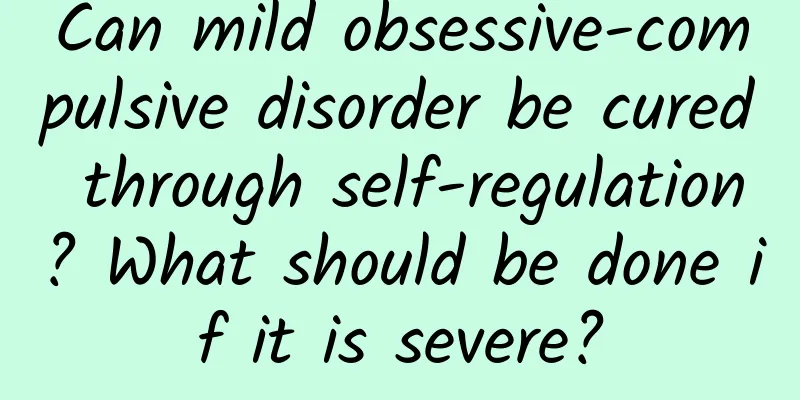Can mild obsessive-compulsive disorder be cured through self-regulation? What should be done if it is severe?

|
Author: Jiang Changqing, Chief Psychologist, Beijing Anding Hospital, Capital Medical University Vice Chairman of the Psychosomatic Medicine Committee of the Chinese Mental Health Association Reviewer: Liu Changwei, Chief Physician, Peking Union Medical College Hospital Obsessive-compulsive disorder is a mild mental disorder. Clinical diagnosis of obsessive-compulsive disorder must meet three criteria: The first is the symptom standard, which requires at least one of the three major symptoms: obsessive thinking, compulsive behavior, and compulsive intention. The second is the severity standard, which requires the obsessive-compulsive symptoms to have an impact on work, study, and life. The third is the course of disease standard. The domestic standard is generally three months, and it must last for three months to be diagnosed as obsessive-compulsive disorder. 1. Can mild obsessive-compulsive disorder be restored to normal through self-regulation? Patients with mild obsessive-compulsive disorder can completely recover by themselves if they understand the law of the occurrence and development of the disease, have a better understanding of the disease, or read some professional books and make self-adjustments. The effect will be more obvious if they consult a psychologist. Some patients will have their symptoms disappear after one or two consultations. Figure 1 Original copyright image, no permission to reprint After obsessive thoughts appear, don't control them, don't get rid of them, just accept them. The better you accept the obsessive thoughts, the faster the symptoms will disappear. Of course, you still have to do things while accepting them. Take it with you to do things that you think you should do, do two things at the same time, and do things inefficiently. In this way, the obsessive thoughts will gradually disappear. Compulsive behavior occurs, such as leaving the house and feeling that the door is not locked. At this time, you will definitely feel uncomfortable, but after going back to check, you will feel very comfortable. In order to pursue a comfortable feeling, you will go back to check more and more times. To deal with compulsive behavior, after controlling the behavior, for example, not going back to check if the door is locked, and experiencing that uncomfortable feeling, after experiencing it many times, this uncomfortable feeling will become lighter and lighter, and the duration will become shorter and shorter, and finally there will be no such uncomfortable feeling anymore. The process of self-regulation is the process of experiencing pain. Whether it is controlling thoughts or controlling behaviors, it is experiencing pain. After experiencing it many times, the symptoms may gradually disappear. If the compulsive behavior is severe, it may not be possible to overcome it on your own and may require medication. 2. What are the drugs for treating obsessive-compulsive disorder? When the compulsive behavior reaches moderate or severe levels, the pain is unbearable. The pain can be alleviated through medication, and you can do whatever the doctor asks you to do. The drugs currently used in clinical practice are basically antidepressants, which are serotonin reuptake inhibitors, but the dose is larger than that used to treat depression, generally 2-3 times the dose used to treat depression. As for the treatment mechanism, it is generally recognized that these drugs can increase the content of serotonin in the synaptic cleft and prevent serotonin from being reabsorbed. Figure 2 Original copyright image, no permission to reprint Once medication is taken for obsessive-compulsive disorder, it is recommended to take it long-term. During medication treatment, a checkup is generally conducted once a month. Even if the symptoms disappear, the medication must be maintained for a period of time, otherwise the symptoms are likely to fluctuate. For patients who are particularly serious and cannot control their condition even with medication, some will undergo brain surgery to destroy a certain nucleus of the nerves. This treatment has good short-term effects, but symptoms tend to recur after half a year, so it is not often used now. There is also electroconvulsive therapy, but the effects are not particularly good. 3. What are the psychological treatments for obsessive-compulsive disorder? Psychological therapies include cognitive behavioral therapy, psychoanalytic therapy, or psychodynamic therapy. Figure 3 Original copyright image, no permission to reprint Cognitive behavioral therapy focuses on the present. Methods such as aversion therapy, exposure therapy, and systematic desensitization are all behavioral therapy methods. Psychodynamics focuses on the past. Some childhood experiences and traumas leave traces in the brain. When you are older and encounter similar stimuli, some childhood experiences will affect the present and manifest in the form of symptoms. However, patients do not know that the current symptoms are related to childhood trauma and experiences, so the symptoms will persist. Through psychoanalysis, free association, dream analysis, and impedance analysis, if the patient can realize that the current symptoms are indeed related to childhood trauma, and indeed find the childhood trauma, and the patient also understands the relationship between the trauma and the current symptoms, then the symptoms lose their meaning of existence, and naturally they can be relieved, and the disease can be cured. In fact, it is a bit like being very anxious when you can't find something, but once you find it, you won't be bothered anymore. For obsessive-compulsive disorder, severe treatment is still very difficult, so once obsessive symptoms occur and affect your life and work, it is recommended to seek medical attention in time, get a clear diagnosis, and receive early treatment. |
<<: Good news for crybabies, because tears actually contain happy hormones!
Recommend
How can women whiten their body skin?
Nowadays, many women not only pursue beautiful fa...
How to regulate women’s sweating?
Dear female friends, if you find yourself sweatin...
"Canned yellow peaches" are sold out! Can they relieve COVID-19 symptoms? Are these 4 methods of recuperation and disease prevention reliable?
With the relaxation of epidemic control, various ...
23 weeks pregnant hard belly
A hard belly at 23 weeks of pregnancy is caused b...
Can I eat loofah during menstruation?
The most important thing for women during menstru...
What is female endocrine regulation like?
For women, endocrine regulation is very important...
What is AIDS and do you know how to test for it?
December 1, 2023 is the 36th "World AIDS Day...
35 weeks lower abdominal pain is pelvic engagement?
The 35th week of pregnancy is the late stage of p...
Why does sugarcane turn black? How to identify sugarcane
As a tropical and subtropical fruit, sugarcane is...
Why do women grow beards?
Nowadays, every woman pursues fashion and a more ...
How to better consume soy products
Soy products are not only rich in high-quality pl...
What does leucorrhea mean?
If women do not pay attention to their living hab...
How to use sunscreen, are you using it correctly?
Sunscreen is an essential item in women's dai...
Causes and treatment of pelvic cystic masses
Pelvic cystic mass usually refers to what is medi...
What to do about insomnia during menopause
When women reach middle age, they will enter meno...









